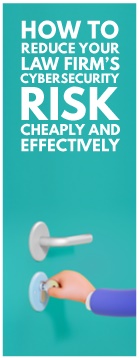How to Reduce Your Firm’s Cybersecurity Risk (Cheaply and Effectively)
Credit Available - See Credits tab below.
Total Credits: 1 Alaska, 1 Arizona, 1 Colorado, 1 Delaware, 1 Idaho, 1 Maine, 1 Michigan, 1 Montana, 1 Nebraska, 1 Nevada, 1 North Dakota, 1 South Carolina, 1 South Dakota, 1 Tennessee, 1 Vermont, 1 Washington, 1 Wyoming
- Average Rating:
- 67
- Categories:
- Cybersecurity
- Faculty:
- Sherri Davidoff
- Duration:
- 1:00
- Format:
- Audio and Video
- Original Program Date:
- Nov 09, 2021
- License:
- Access for 3 month(s) after purchase.
Description
With professional hackers and cybersecurity criminals posing a constant threat to law firms big and small, the reality is that your firm’s sensitive data will always be a target. But with everything else on your plate, how can your firm afford, let alone find time, to safeguard against these ever-present and constantly evolving risks? In this 1-hour CLE, Sherri will walk through real examples of the types of cyberattacks and strategies leveled against law firms and demonstrate low-cost, effective ways to bolster your firm’s defenses. Learn how to cheaply and effectively reduce the likelihood of a cyberattack.
Under various states’ rules of professional conduct, lawyers have an ethical obligation to protect their clients’ information and files. Attention should be paid to the benefits and risks associated with relevant technology. The greatest risk lawyers face today with the use of technology is the possibility of their systems being hacked by cybercriminals (by ransomware or other means) to gain access to sensitive data to hold for ransom payments.
Confidentiality rules state that a lawyer shall make reasonable efforts to prevent the inadvertent or unauthorized disclosure of, or unauthorized access to, client information. The good news is this risk can be averted by a few simple and cost-effective security strategies which you’ll learn in this cybersecurity course.
Credits
| General Credits | Ethics Credits |
| 1 | 1 |
| General Credits | Ethics Credits |
| 1 | 1 |
| General Credits | Ethics Credits |
| 1 | 1 |
| General Credits | Ethics Credits |
| 1 | 1 |
| General Credits | Ethics Credits |
| 1 | 1 |
| General Credits | Ethics Credits |
| 1 | 0 |
| General Credits | Ethics Credits |
| 1 | 1 |
| General Credits | Ethics Credits |
| 1 | 1 |
| General Credits | Ethics Credits |
| 1 | 1 |
| General Credits | Ethics Credits |
| 1 | 0 |
| General Credits | Ethics Credits |
| 1 | 1 |
| General Credits | Ethics Credits |
| 1 | 1 |
| General Credits | Ethics Credits |
| 1 | 1 |
| General Credits | Ethics Credits |
| 1 | 1 |
| General Credits | Ethics Credits |
| 1 | 1 |
| General Credits | Ethics Credits |
| 1 | 0 |
| General Credits | Ethics Credits |
| 1 | 1 |
Handouts
| How to Reduce Risk Final Materials (11.73 MB) | Available after Purchase | ||
Faculty

Sherri Davidoff Related Seminars and Products
Founder
LMG Security
Sherri Davidoff is the CEO of LMG Security, as well as a noted speaker, trainer, white hat hacker and author of the recently released book, “Data Breaches: Crisis and Opportunity.” As a recognized expert in cybersecurity and data breach response, Sherri has been called a "security badass" by The New York Times. She has conducted cybersecurity training for many distinguished organizations, including the Department of Defense, the American Bar Association, FFIEC/FDIC, and many more. She is a faculty member at the Pacific Coast Banking School, and an instructor for Black Hat, where she teaches her “Data Breaches” course. She is also the co-author of Network Forensics: Tracking Hackers Through Cyberspace (Prentice Hall, 2012), a noted security text in the private sector and a college textbook for many cybersecurity courses. Sherri is a GIAC-certified forensic examiner (GCFA) and penetration tester (GPEN) and holds her degree in Computer Science and Electrical Engineering from MIT. She has also been featured as the protagonist in the book, Breaking and Entering: The Extraordinary Story of a Hacker Called “Alien”.
Reviews
| 5 |
|
| 4 |
|
| 3 |
|
| 2 |
|
| 1 |
|





